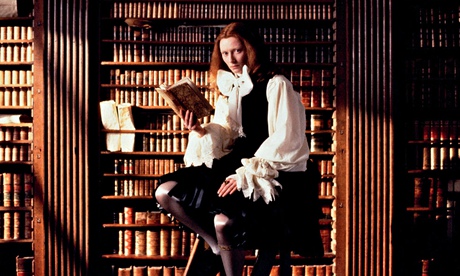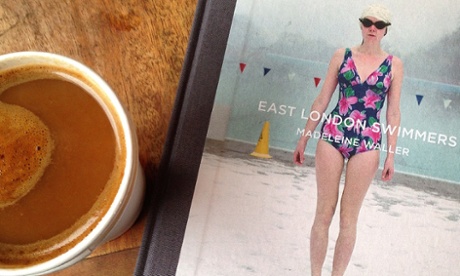Fictionalised biographies – novels based on the life of a famous person – are ten-a-penny. And why not? They're easy enough to turn out. Other people – the actual biographers – have done the hard work. All the novelist has to do is to twist the "facts" to suit their own interpretation of the life in question, and away they go.
In writing a novel based on the Young British Artists, I decided I wanted to do something different: write the biography of a made-up person as if they were real. The trick would not be to fool the reader into thinking they had actually existed (see William Boyd's Nat Tate, below) but to access that special kind of reading we slip into when reading something we assume is factual – by which I mean, basically: gullibility. Where a reader might ask, of character in a novel, "Now, would they really do that?" of a character in a biography the question would be, "Wow, why on earth did they do that?"
Here then are 10 "fictitious biographies" (Nabokov's term) that I've found particularly inspiring.
1. Doctor Faustus by Thomas Mann
This slow, stodgy, quite wonderful novel gave me the template for my own fake memoir. Mann's book is the story of the modernist composer Adrian Leverkühn, as told by his childhood friend Serenus Zeitblom. The pathos of the book comes from dull, plodding Zeitblom's realisation that he can never hope to catch the mercurial personality of his genius friend, but that he must try nonetheless.
2. Orlando by Virginia Woolf
Woolf's light-hearted "escapade" is a satirical romp through the very idea of a biography, with its portrait of a nobleman who lives from the Elizabethan era right through to the 1920s, somehow changing gender along the way. Its sentence-by-sentence delight in evoking past times offers a model that few "proper" historical accounts can hope to follow – not least because it's skipped on a decade before they've tied their bootlaces.
3. The Real Life of Sebastian Knight by Vladimir Nabokov
It's no surprise that many "fictitious biographies" include a fair bit of the biographer in their narrative. The model for this is surely AJA Symons's The Quest for Corvo, with its detective story premise, which came out shortly before Nabokov started writing this, his first English language book. It is the tale of celebrated writer Sebastian Knight, told by his half-brother, V, though as you'd expect with this author the elusive quarry retreats even as the befuddled hunter advances, and by the end we're as uncertain about the one as we are about the other.
4. Sartor Resartus by Thomas Carlyle
This almost uncategorisable book takes the form of a critical biography of the fictional German Romantic philosopher Diogenes Teufelsdröckh, who saw clothing as the governing metaphor of human existence. If that makes him sound rather like Roland Barthes avant la lettre, then the comparison ends there. It's a tough read, not least for the difficulty in getting a handle on the tone. Carlyle's style is a heavy-handed parody of academic prose, yet he's using the figure of Teufelsdröckh to give us a disguised autobiography.
5. Nat Tate by William Boyd
Boyd's benign art-world hoax presented itself on publication as a serious monograph on a real but little-known American abstract expressionist painter, who supposedly threw himself off the Staten Island Ferry at the age of 31, after destroying nearly all his paintings. The book is far more than a prank, however – it's a melancholy treatise on the limits of biography. We know scarcely more about Tate at the end than at the beginning. The gaps and absences are all.
6. Kiss and Tell by Alain de Botton
This early novel by the pop philosopher turns the central idea of biography on its head by taking as its subject not just a non-celebrity but someone wholly unremarkable: one Isabel Jane Rogers. De Botton has great fun with the paraphernalia of the genre, including an index, and various photographs of quite staggering banality: you could swap about the shots of Rogers' boyfriends, and the book would be changed not one jot.
7. An Equal Stillness by Francesca Kay
Fictitious biographies, left to their own devices, will tend to drift towards the novelistic (fictitious autobiographies, from Robinson Crusoe onwards, are too common to be of use here). That's something that happens with Kay's book, though at least she covers her back by having the biography of abstract painter Jennet Mallow written by a poet (and family member) who is quite open about imagining his subject's thoughts and feelings "when I could not have known them".
8. The Big Music by Kirsty Gunn
This is more "fictitious memoir" than "fictitious biography", but is far too interesting to omit. Gunn plays the Carlyle trick of acting as supposed editor for a set of "found papers", detailing the history of Scottish bagpipe player and composer John Sutherland. The "papers" read like fiction, yet come with notes and appendices. Gunn is not playing the parody game, though: it's the music she's after, and it's the music she gets. A seriously good book.
9. DooDaaa: The Balletic Art of Gavin Twinge by Ralph Steadman
Authors, composers, artists: it's no surprise that writers like picking other creators for their fictitious biographies – no politicians, footballers or royals here. As you'd expect, Ralph Steadman's biography ("by" Ralphael Steed) of Doodaaaist Gavin Twinge is a full-throttle, rambunctious satire that writes an alternative history of British and international art, with plenty of original art and illustration to liven up its pages.
10. Summertime by JM Coetzee
Another anomaly: after two volumes of semi-fictional autobiography (Boyhood, and Youth) Coetzee's third entry in the genre produced this, which could perhaps be best described as: a memoir in the form of a novel in the form of notes towards a fictitious biography of an invented character modelled on the author. It is largely made up of transcripts of interviews conducted by Coetzee's surrogate author with people who knew "John Coetzee", though they repeatedly fail to give the biographer what he is after. Point taken, John.











